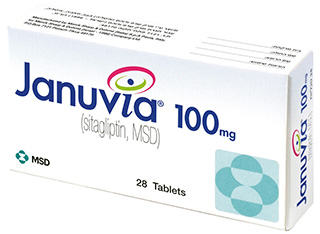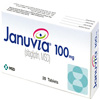  | Januvia is used for treating type 2 diabetes in patients who cannot control blood sugar levels by diet and exercise alone. Active Ingredient: Sitagliptin Availability: In Stock (17 packages) |
| Product name | Per Pill | Savings | Per Pack | Order |
|---|---|---|---|---|
| 10 pills | $8.02 | $80.18 | ADD TO CART | |
| 20 pills | $6.03 | $39.69 | $160.36 $120.67 | ADD TO CART |
| 30 pills | $5.37 | $79.38 | $240.54 $161.16 | ADD TO CART |
| 40 pills | $5.04 | $119.07 | $320.72 $201.65 | ADD TO CART |
| 60 pills | $4.71 | $198.45 | $481.08 $282.63 | ADD TO CART |
| 90 pills | $4.49 | $317.51 | $721.62 $404.11 | ADD TO CART |
INDICATIONS
Januvia is used for treating type 2 diabetes in patients who cannot control blood sugar levels by diet and exercise alone. It is used along with diet and exercise. It may be used alone or with other antidiabetic medicines. Januvia is a dipeptidyl peptidase-4 (DPP-4) inhibitor. It works by increasing the amount of insulin released by your body, and decreasing the amount of sugar made by your body.
INSTRUCTIONS
Use Januvia as directed by your doctor.
- Take Januvia by mouth with or without food.
- Take Januvia on a regular schedule to get the most benefit from it.
- Continue to take Januvia even if you feel well. Do not miss any doses.
- If you miss a dose of Januvia, take it as soon as possible. If it is almost time for your next dose, skip the missed dose and go back to your regular dosing schedule. Do not take 2 doses at once.
Ask your health care provider any questions you may have about how to use Januvia.
STORAGE
Store Januvia at room temperature, between 68 and 77 degrees F (20 and 25 degrees C). Brief storage at temperatures between 59 and 86 degrees F (15 and 30 degrees C) is permitted. Store away from heat, moisture, and light. Do not store in the bathroom. Keep Januvia out of the reach of children and away from pets.
MORE INFO:
Active Ingredient: Sitagliptin.
SAFETY INFORMATION
Do NOT use Januvia if:
- you are allergic to any ingredient in Januvia
- you have type 1 diabetes
- you have high blood ketone levels (diabetic ketoacidosis).
Contact your doctor or health care provider right away if any of these apply to you.
Some medical conditions may interact with Januvia. Tell your doctor or pharmacist if you have any medical conditions, especially if any of the following apply to you:
- if you are pregnant, planning to become pregnant, or are breast-feeding
- if you are taking any prescription or nonprescription medicine, herbal preparation, or dietary supplement
- if you have allergies to medicines, foods, or other substances
- if you have kidney problems
- if you have a history of inflammation of the pancreas (pancreatitis).
Some medicines may interact with Januvia. Tell your health care provider if you are taking any other medicines, especially any of the following:
- Digoxin or sulfonylureas (eg, glipizide) because the risk of their side effects may be increased by Januvia.
This may not be a complete list of all interactions that may occur. Ask your health care provider if Januvia may interact with other medicines that you take. Check with your health care provider before you start, stop, or change the dose of any medicine.
Important safety information:
- Follow the diet and exercise program given to you by your health care provider. Proper diet, regular exercise, and regular blood sugar testing are important for best results with Januvia.
- Check your blood sugar levels as directed by your doctor. If they are often higher or lower than they should be and you take Januvia exactly as prescribed, tell your doctor.
- It may be harder to control your blood sugar during times of stress such as fever, infection, injury, or surgery. Talk with your doctor about how to control your blood sugar if any of these occur. Do not change the dose of your medicine without checking with your doctor.
- Januvia usually does not cause low blood sugar. However, low blood sugar may occur when it is used along with certain other medicines for diabetes (eg, sulfonylureas). Low blood sugar may make you anxious, sweaty, weak, dizzy, drowsy, or faint. It may also make your heart beat faster; make your vision change; give you a headache, chills, or tremors; or make you hungrier. It is a good idea to carry a reliable source of glucose (eg, tablets, gel) to treat low blood sugar. If this is not available, you should eat or drink a quick source of sugar like table sugar, honey, candy, orange juice, or non-diet soda. This will raise your blood sugar level quickly. Tell your doctor right away if this happens. To prevent low blood sugar, eat meals at the same time each day and do not skip meals.
- Lab tests, including fasting blood glucose, glycosylated hemoglobin, and kidney function, may be performed while you use Januvia. These tests may be used to monitor your condition or check for side effects. Be sure to keep all doctor and lab appointments.
- Use Januvia with caution in the elderly; they may be more sensitive to its effects.
- Januvia should be used with extreme caution in children younger 18 years; safety and effectiveness in these children have not been confirmed.
- Pregnancy and breast-feeding: If you become pregnant, contact your doctor. You will need to discuss the benefits and risks of using Januvia while you are pregnant. It is not known if Januvia is found in breast milk. If you are or will be breast-feeding while you use Januvia, check with your doctor. Discuss any possible risks to your baby.
SIDE EFFECTS
All medicines may cause side effects, but many people have no, or minor, side effects.
Check with your doctor if any of these most common side effects persist or become bothersome:
Diarrhea; headache; nausea; runny or stuffy nose; sore throat; upper respiratory infection; upset stomach.
Seek medical attention right away if any of these severe side effects occur:
Severe allergic reactions (rash; hives; itching; difficulty breathing or swallowing; tightness in the chest; swelling of the mouth, face, lips, or tongue; unusual hoarseness); fever, chills, or persistent sore throat; red, blistered, swollen, or peeling skin; symptoms of pancreas inflammation (eg, severe stomach or back pain with nausea or vomiting, stomach tenderness or swelling, fast heartbeat, dizziness).
This is not a complete list of all side effects that may occur. If you have questions about side effects, contact your health care provider.